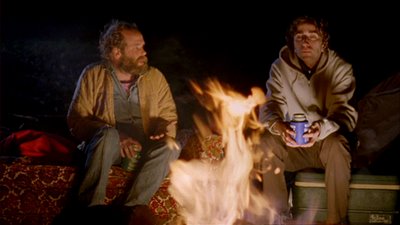Old Joy
 Photo: Will Oldham and Daniel London, Old Joy
Photo: Will Oldham and Daniel London, Old JoyThis is a low budget independent film directed and co-written by Kelly Reichardt that recently had four screenings at ACMI. Maybe it’s the seasonal vacuum of quality cinema one expects this time of year, or the film has some reputation preceding it, or the fact that I saw it at its final ACMI screening on Sunday – I was surprised at the huge turnout. ACMI’s smaller cinema 1 was packed to capacity.
Old Joy is a quietly accomplished film. Poetic and observational, aspects of it remind me of different films. The observational aspect reminds me of Jim Jarmusch’s Broken Flowers, particularly the capturing of seemingly meaningless passing details. The poetic nature and cryptic relationship dynamics reminded me of the quietly confident nature of Nuri Bilge Ceylan’s Iklimer (Climates, 2006), my favourite film at last year’s MIFF.
Like Climates, the film is a nuanced reflection on a disintegrating relationship. The premise is simple: two thirty-something friends from college, Mark (Daniel London) and Kurt (Will Oldham), meet up after a long break for a weekend camping trip to a secluded spot in the mountains.
There is tension between the characters, and the film observes this without giving clarification for the causes or any resolution. Mark seeks permission to go camping from his expectant partner Tanya (Tanya Smith) who appears not overly happy at the idea.
Mark’s character seems quietly introspective (he’s meditating in the garden when Kurt’s call is made) and doesn’t talk a lot. When Kurt first suggests they take Mark’s aging Volvo station wagon rather than Kurt’s beaten up old truck, there is a hint of someone who is a hanger-on, an idea supported by Kurt borrowing ten dollars from Mark.
For Mark, the outing seems to represent an escape from domestic life while for Kurt it’s another adventure. While neither appears to have progressed materially in life (nor particularly inclined to), Mark has concerns about family, home and security while Kurt seems to have changed little since college days. Close friends at college, they have drifted apart and Kurt is keen to bridge the divide that time and circumstances have created.
 In the absence of dialogue, we get a sense of what goes on in Mark’s head by the radio program he is listening to in the car as it travels out of the city. This is a very clever device that adds a subtle and interesting layer to the film. Discussion of the war in
In the absence of dialogue, we get a sense of what goes on in Mark’s head by the radio program he is listening to in the car as it travels out of the city. This is a very clever device that adds a subtle and interesting layer to the film. Discussion of the war in
Some may find this boring; I found it fascinating as it captures the quiet minutiae of life that are usually overlooked in mainstream films attempting to overwhelm the senses. It’s consistent with my belief that everyone’s life is worthy of a story and reminds me of Matt Riviera’s 10 Thoughts on Watching and Appreciating Film. Point three: If a film is slow get into the Zone. For me, I didn’t need to get into the Zone; I was right in there with it and enjoying the ride.
The meandering music of Yo La Tengo (who also contributed to the vastly different Shortbus) really added a nice ambience to the road journey. The dialogue, mostly by Kurt was also interestingly idiosyncratic but believable – including egocentric ideas about the basis of the universe. My interpretation of the dialogue was that Kurt was trying to appeal to the intellectualism shared during their college days and hadn’t really moved on in life as Mark had with his ‘real-life’ concerns. Kurt notes an uncomfortable gulf between them.
The title derives from a dream Kurt has in which a woman tells him that “sorrow is nothing but worn-out joy”. Sorrow is the subtle theme of the film. By the director’s minimalist approach, we are left to trust our own instincts as to what has happened in the past (in terms of friendship), what has been lost and what may become of the protagonists.
 I found the destination of the men, Bagby Hot Springs, quite uplifting. It reminded me of drives I had taken to places like
I found the destination of the men, Bagby Hot Springs, quite uplifting. It reminded me of drives I had taken to places like
Of some interest is that the film was co-produced by Todd Haynes, director of significant films like Safe and Far From Heaven.
If your idea of a night out is a visit to the local cinemaplex, forget Old Joy. If you happen to get the opportunity to see it, don’t expect a masterpiece or anything profound. In its own quiet melancholy way and oozing with authenticity, it is a beautifully poetic rumination on human relationships that ends as subtly and ambiguously as it starts. It leaves a quiet resonance in the mind as one leaves the cinema or even now as I recall it. I hope it comes out on DVD as I’d like to buy it.
Dir, Ed: Kelly Reichardt Rating: Unclassified Duration: 76 min Genre: drama Language: English Country: USA Release: 4/1/07 – 7/1/07, ACMI Scr: Jonathan Raymond, Kelly Reichardt Prod: Joshua Blum, Todd Haynes, Lars Knudsen, Jay Van Hoy, Neil Kopp, Mike S. Ryan, Anish Savjani, Rajen Savjani Sound Des: Eric Offen Phot: Peter Sillen Prod Des: Morgan Currie Mus: Yo La Tengo Cast: Daniel London, Will Oldham, Tanya Smith


Comments